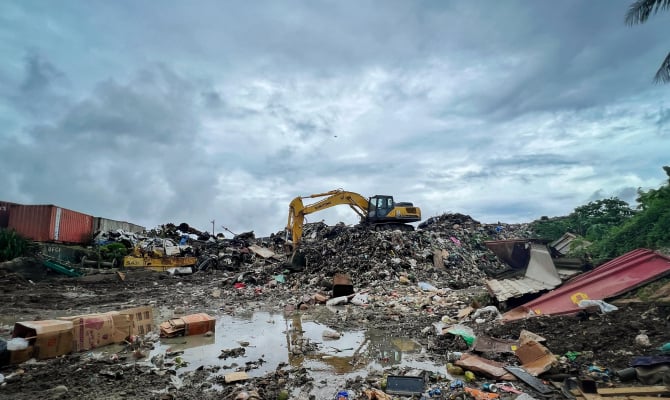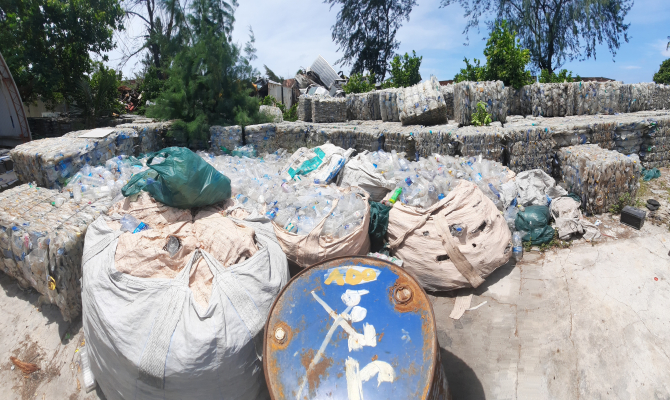The recent national waste audit of the Federated States of Micronesia (FSM) found that almost 22 percent of waste being sent to landfills was organic, food waste and vegetation.
With this knowledge, the Environmental Protection Agencies (EPAs) in Chuuk and Yap states will work with PacWastePlus to introduce or expand composting programmes for communities currently without garbage collection services.
The project is a partnership between the FSM Department of Environment, Climate Change and Emergency Management (DECCEM), the Environmental Protection Agency (EPA) for the state of Chuuk, the Environmental Protection Agency for the state of Yap and the Secretariat of the Pacific Regional Environment Programme (SPREP) administered through the European Union (EU) funded PacWastePlus programme.
For the past year, despite the global challenges caused by the COVID 19 pandemic, dedicated staff from respective agencies of FSM have been working with the PacWastePlus programme team to develop the project.
On 19 July 2021, a Memorandum of Understanding (MoU) was signed by Andrew R Yatilman, FSM Secretary for DECCEM, Christina Fillmed, Director, EPA for the state of Yap, Bradford Mori, Director, EPA for the state of Chuuk and the Director-General of SPREP, Kosi Latu, to enable the organics management project implementation to commence formally in FSM.
“Our PacWastePlus programme will enable FSM to undertake a feasibility study to design and implement suitable and sustainable composting programmes for targeted communities to support agricultural activities,” said the SPREP Director General, Kosi Latu.
The SPREP Director General further added that the MoU provides a framework of co-operation, agreed project actions and responsibilities between SPREP and FSM implementing agencies to work in partnership and implement the organic waste management project through the PacWastePlus programme.
“With the implementation of this project, we hope that all organic wastes generated in the FSM are diverted to organic waste processing systems, thereby reducing the volume of waste and extending the lifespan of the landfill”, said Andrew Yatilman, Secretary for FSM DECCEM.
“The compost will then be used back by our communities on land to improve their crops and retain quality soils”, he further added.
Project actions in the Chuuk state includes undertaking a feasibility study to design an organic processing programme that will collect and process organic wastes generated in nine communities on Weno.
“We intend, with the support of PacWastePlus programme, to construct and equip an organic processing facility at the Neauo Landfill to receive and process organic wastes generated from the identified nine communities from Weno”, said Mr Bradford Mori, Director, EPA for the state of Chuuk.
The activities in the state of Yap include design and implementation, based on a feasibility study, an organic processing programme that will collect, and process organic wastes generated in Yap.
“With the implementation of this project, we hope to build on our current composting efforts, and expand such waste minimisation activities, in collaboration with communities, to support waste management and livelihoods in Yap State”, said Ms Christina Fillmed, Director, EPA for the state of Yap.
The project team in FSM have expressed appreciation to EU and SPREP for the assistance through the PacWastePlus Programme to develop a meaningful project and the continued guidance being provided as the project moves into the implementation stage.
“We are excited to commence the implementation of this project in FSM, with the assistance of PacWastePlus programme, that will develop a sustainable organic waste management solution and divert organic waste from our landfills”, said the country focal point for the project, Patricia Pedrus, Deputy Assistant Secretary, Waste Management & Pollution Control Unit, DECCEM.
The organic waste management project will facilitate various awareness and engagement campaigns to inform local communities on FSM’s Organic Processing Program and develop a package of resources that capture learnings from projects in Chuuk and Yap for the national government and state EPAs to use and design a successful organic processing programme and facility.
The Pacific-EU Waste Management Programme (PacWastePlus) is a EUR 16.5 million, 72-month project funded by the European Union and implemented by the Secretariat of the Pacific Regional Environment Programme (SPREP) and will address both the cost-effective and sustainable management of waste and pollution as well as broader impacts including human health and wellbeing, climate change, disaster management, biodiversity conservation and resource recovery.
Priority waste streams include hazardous wastes (specifically asbestos, E-waste and healthcare waste), solid wastes (specifically recyclables, organic waste, disaster waste and bulky waste) and related aspects of wastewater.
This story was produced by Leanne, published at SPREP on 12 October 2021, reposted via PACNEWS.




